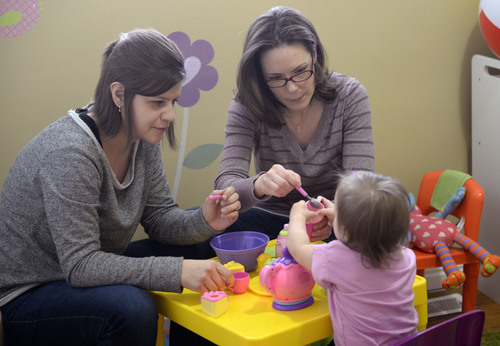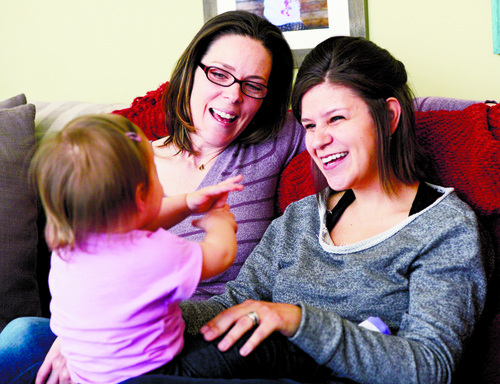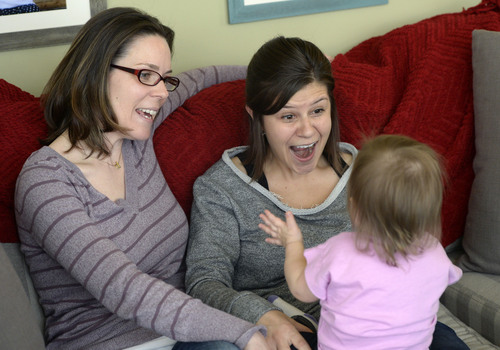This is an archived article that was published on sltrib.com in 2014, and information in the article may be outdated. It is provided only for personal research purposes and may not be reprinted.
A lesbian couple have gone from elation to frustration in their quest to be equally recognized as mothers of their daughter after the Utah Office of Vital Records and Statistics on Tuesday refused to accept a court order approving their second-parent adoption.
Attorney Shane A. Marx, who represents Kimberly and Amber Leary, presented the office with a final adoption order signed March 26 by a 3rd District Court judge and requested a new birth certificate listing both women as parents of their 16-month-old daughter. Only Amber Leary is currently named on the birth certificate for their child, whom the couple conceived through assisted reproduction.
Marx said a clerk requested the couple's marriage certificate — something Marx said is not required of heterosexual couples, but the office says is routine — and couldn't issue the document without proof the Learys are validly married.
"Legally, that's not a distinction they're allowed to make," Marx said. "If a judge orders it, they are not allowed to choose. That is not the role of the Office of Vital Statistics. It is the judge who decides if a couple is legally qualified to adopt."
Two assistant attorneys general joined the hours-long dispute and eventually told Marx the Utah's attorney general's office would review the matter.
Marx left without an amended birth certificate.
Tom Hudachko, spokesman for the Utah Department of Health, said it is "standard practice" to request a marriage certificate in all adoptions involving married couples. As for the status of the Learys' request, Hudachko said, "the department is reviewing the court order with our attorneys to determine our options for proceeding."
But Marx said the basis for the adoption order is clear: "Once you grant somebody a right, it can not be taken away," Marx said. "Once all these couples married, they obtained rights, and the state can't revoke them because of a stay in a separate case in which they are not involved. That's a clear violation of due process."
An estimated 1,243 same-sex couples married between Dec. 20, 2013, when U.S. District Court Judge Robert Shelby overturned Utah's ban on same-sex marriage, and Jan. 6, 2014, when the U.S. Supreme Court put the ruling on hold. A number of the those couples subsequently sought second-parent adoptions of their children, which are being opposed by the state.
Amber and Kimberly Leary, who have been together more than six years, married in the first hours after Shelby's decision was released and filed an adoption petition in state court on Dec. 24 — a move they expected would finally resolve Kimberly Leary's ongoing worry about not being legally recognized as one of their daughter's parents.
But following the stay order, 3rd District Judge Andrew Stone, who is handling the adoption, required Marx to notify the attorney general's office and gave the state 45 days to respond. On Feb. 24, the Utah Attorney General's Office submitted an opinion — also filed in several other adoption cases involving same-sex parents — asserting that with Shelby's ruling on hold while the state appeals it, the ban on same-sex marriages remains in effect and any marriages that took place are invalid. The AG's opinion asked judges to stay adoption proceedings or that the couples voluntarily withdraw their petitions. Under Utah law, couples who are in a cohabiting relationship are not allowed to adopt.
In response, Marx argued in a court that the Learys were acting under a valid law at the time they married and thus had vested rights granted to them by the state.
In a hearing held last Wednesday, the state judge agreed, Marx said.
As the Learys, their daughter and relatives who had flown in from out of state listened, Stone approved their adoption.
According to Marx, the judge found the state failed to file a motion requesting a stay or to intervene in the case; it also did not file a motion addressing the constitutional issues the couple raised. Stone then found the Learys were validly married under the state's laws and were entitled to have their marriage recognized regardless of the stay of Shelby's ruling and the eventual outcome of that case, which involves different plaintiffs and issues, Marx said.
Marx said the judge also found approving the adoption was in the child's best interests.
"It was not only a gift to us but to our family as well," Kimberly Leary said. "My dad got to sit there and hear the judge say our daughter is legally my daughter. It was the best day of our lives. It was a big celebration. When that ruling was handed down, it was like this bubble went around my family."
And then came Tuesday. After waiting hours to hear from their attorney, the Learys got the bad news.
"It was completely deflating," Kimberly Leary said. "To think we'd gone through all of this, we followed the law to the 'T,' submitted all the paperwork, answered all the questions — whether it felt intrusive or not, we did it. After we did all of that, for the Office of Vital Statistics to not recognize this is a judge's order and require our attorney to provide other information to supplement that any other heterosexual couple wouldn't is just not right."
Adds Amber Leary: "Our judge made a ruling and nobody seems to be following that," she said.
Marx adamantly disputes that the office routinely requires marriage certificates, saying he has never been asked to provide a license in an opposite-sex clients' adoption. Nor is it on a list of required documents contained in a letter advising couples how to get a new certificate by mail, he said. And an administrative rule directs the state registrar to issue a new birth certificate "upon receipt of a court order of adoption or a [certified] court report of adoption."
"Most importantly, they have no authority to ask for a marriage license," Marx said. "That is evidence that is presented and weighed by the judge before he grants the adoption and orders amendment of a birth certificate.
Adoption attorney Wes Hutchins, who is not involved in the Leary case but was asked about his experience, said he has only been asked to provide a certified copy of the adoption decree and report of adoption.
"Never, ever in the 23 years that I've been doing it have I been asked for a marriage certificate," Hutchins said.
While the agency did contact the A.G.'s office, "nobody from our office told anybody from the recorder's office not to comply with" the judge's order, said Parker Douglas, chief of staff.
"It's a valid court order until somebody challenges it," Douglas said.
But with the ongoing litigation over Shelby's ruling, the status of couples such as the Leary's is "wide open" to legal interpretation, he said.
Meanwhile, Utah's law stands.
"What Utah's law says isn't intended to demean any child or parent," Douglas said. "What it upholds is a model of gender complementarity and diversity as the best model of parenting."
Douglas said the attorney general's office is reviewing its options, including whether to seek a stay or appeal the order. The situation is complicated because the state is technically not a party in the case, though it has authority to intervene on its own initiative in cases involving constitutionality of state laws. He expects a decision on what action to take by early next week.
"Everybody is trying to take these things seriously and move as quickly as possible," Douglas said, given that children are involved and the relationships are "felt very deeply."
Twitter: @Brooke4Trib







